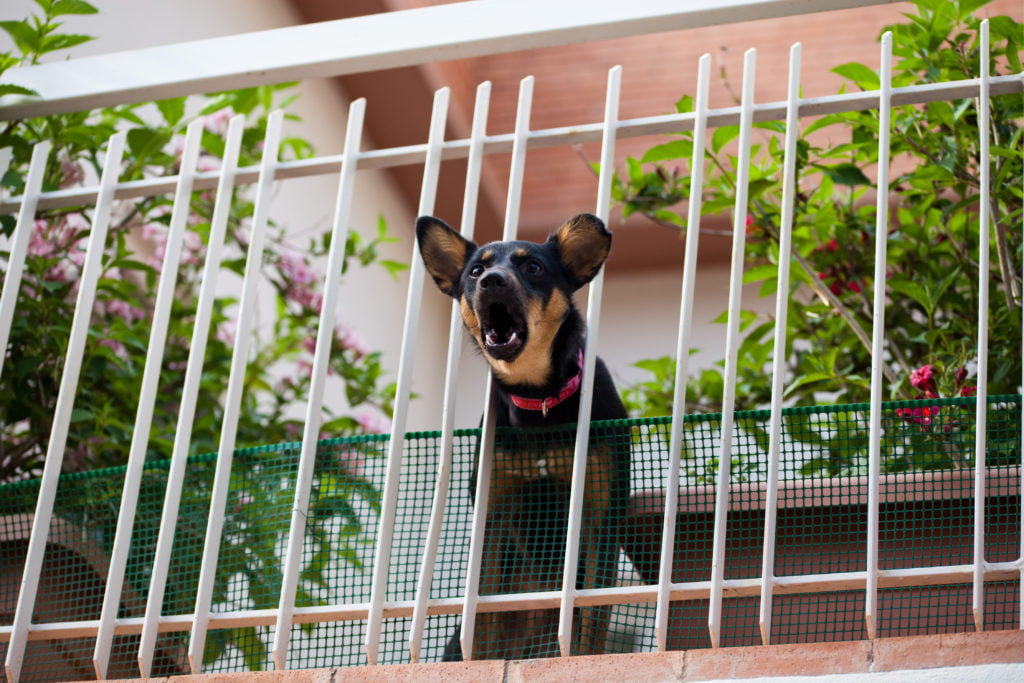I often get complaints from my clients that their dog is barking too much. It is sometimes tricky to get them to see that barking is normal behaviour for dogs.
However, excessive barking can become a problem and a source of strife within your family and your community.
One way of finding out the severity of barking is to ask your neighbours whether your dog is barking when you go out. Does your pooch bark all day or only at certain times of the day? You could also try installing a nanny cam and see for yourself.
Why is my dog barking so much?
Dogs bark for numerous reasons. Hence solutions to dog barking can vary from one pooch to the other.
Here are some reasons that may be causing your four-legged companion to bark excessively as well as some tips on how to stop a dog from barking.
Is your dog bored?

You have seen it on telly before: a bored kid is a destructive kid!
Exercise your dog in the morning before you go out to work. Not only is it good for your pet’s mental and physical health, but it is also good for yours.
Try feeding them a meal in the morning to encourage them to take a nap (very much like how I would love to sometimes!).
Leave interactive toys out for him or her to play with. If you like, alternate access to different toys daily – this keeps the toy ‘fresh’ and exciting for your dog.
One stimulating game I like to play with my pups Diesel and Dolce is “Seek”. I hide some of their favourite toys around the house and get the doggies to search for them.
Doggie day care has become popular recently and is a great way for your furry kid to socialise with other doggies and keep him/her out of trouble.
How about a dog walker? I spent a few summers walking dogs as a part-time job for busy professionals. I found that it really made a huge difference to the anxiety levels of the dogs after a good 30-minute walk.
Is your dog anxious?
This is a very common behavioural problem I see in the clinic. And excessive dog barking can be a symptom.
There are several treatments available, but many owners are quick to jump onto drugs.
I agree that training can sometimes be frustrating and unrewarding, but I still prefer a “non-invasive” method.
The goal is to train your pet to be calm whenever you are out. It pays to ignore attention-seeking behaviour and only reward your dog for being relaxed.
Try not to pay attention to your pooch for 30 minutes before you leave. Repeat the same action after you come back into the house. Again, it is important to only reward your pet when he or she is calm and relaxed.
Another useful method is desensitising your four-legged companion to stimulus associated with you leaving home (e.g., picking up your keys, putting on your work clothes, etc).
Try picking up your keys and not leaving the house. Make sure you ignore your pet if he or she shows anxiety. Reward when calm. More advanced training includes taking short breaks away from home and gradually increasing the time your dog is left alone at home.
Exercise and toys are always a good addition to the above training methods.
Is your dog afraid of something?
Is there construction work occurring nearby? Or noise coming from your neighbours?
Sometimes normal noises you encounter everyday (such as lawnmowers and thunderstorms) can cause fear in your pooch. And barking may be their natural response.
Is your dog an attention-seeker?

Occasionally when I look at a dog barking at their owners, I can imagine them saying “Look at me! Look at me daddy! Look at me Mummy! Wee! Look look look at me!”
You can simply modify this attention-seeking barking by ignoring them.
Try avoiding eye contact, not talking to them, or walking away from them. Reward your furry kid only when he or she is calm and relaxed.
Is your dog territorial?
Is your neighbour’s dog inciting your pooch to bark? Do you live on a busy street with many passers-by?
If so, try associating these stimuli with rewards. It is important to only give a reward when your dog is relaxed and not barking.
Organise a play date with the dog next door or get your neighbours to give treats every time they walk past.
If you have tried the above methods and are still have a dog barking excessively, then perhaps it is time to consult your veterinarian for medical intervention.










